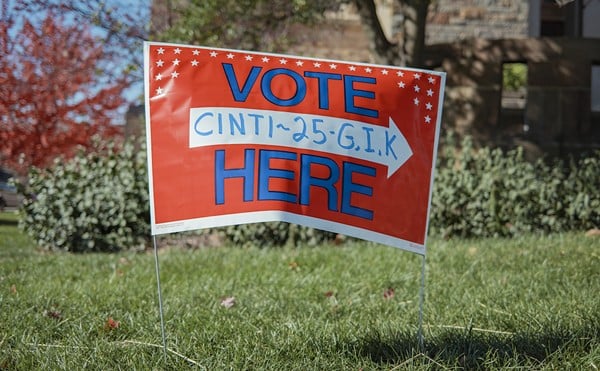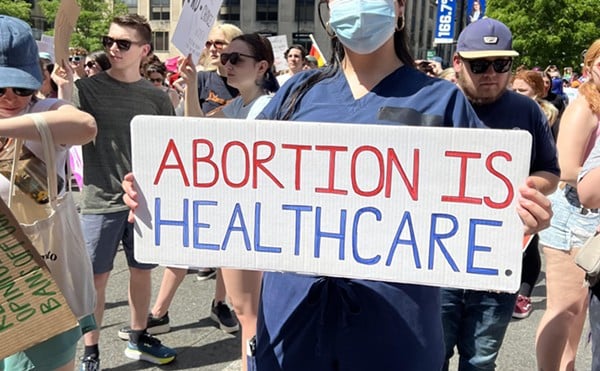|
Talk about dubious distinctions. Ohio is one of only two states in the U.S. whose minimum wages are lower than the federal minimum wage.
At $4.25 per hour, Ohio's minimum wage is considerably lower than the federal rate of $5.15/hour. Of course, it could be worse. In Kansas, true-minimum waging pays $2.65 an hour.
But why does this matter? By law, doesn't the federal minimum wage trump any and all states' rates? A total of 45 states set their own minimum wage rates; and if their rates differ from federal wage law, the higher rate applies.
But federal law allows certain exemptions, according to Katy Heins, lead organizer for Let Justice Roll, Ohio — a campaign to place on the ballot a measure to raise Ohio's minimum wage to $6.85 an hour. Not all employers have to pay the federal minimum.
"It depends on the size of the business and whether or not it is engaged in interstate commerce," Heins says.
Last year 520,000 Americans reported earning the federal minimum rate of $5.15 an hour, and 1.5 million Americans reported earning lower hourly wages, according to the U.S. Labor Department's Bureau of Labor Statistics. Those statistics showed 25,000 Ohioans earning the federal minimum wage and four times as many, or 100,000, earning the state minimum wage of $4.25 an hour. Only two other states, Florida and Texas, have more workers earning less than $5.15 an hour.
Heins estimates the ballot proposal would affect about 400,000 Ohioans. But even if it passes, the minimum wage would still be too low, she says. Let Justice Roll's coalition of more than 50 community-based organizations contend that the minimum wage would have to be raised to $8.82 an hour to have the equivalent peakpurchasing power that it had in 1968, when the minimum wage was $1.60 an hour.
Let Justice Roll notes that, in the past eight years, Congress has raised its own pay seven times — by $28,500 a year. In those same eight years minimum-wage workers haven't received a single raise; they continue to earn $10,700 a year — $5,000 below the poverty line for a family of three. People working full-time for the state minimum wage earn only $8,840 per year. Even for a single individual, that falls $1,000 below the federal poverty level.
The Ohio General Assembly recently rejected a proposal to increase the state minimum wage.
"It came to a vote but was defeated by about four or five votes," Heins says. "Seventy-five percent of Ohioans think it should be raised, but the General Assembly wouldn't move on it."
Let Justice Roll began circulating petitions on Election Day. It needs 322,000 signatures in order for the measure to be placed before voters in 2006.
Many opponents of raising minimum wages argue that raising the rates will lead to consumer price increases, especially in restaurant and retail prices, which in turn will culminate in significant job losses. They also contend that minimum wages raise employment barriers for people with little or no work experience or education.
Increasing the state minimum wage to $6.85 an hour would hurt businesses, according to Doug Moorman, vice president for government affairs at the Cincinnati USA Chamber of Commerce.
"We have not taken a position yet on this particular issue," he says. "(But) it represents about a one-third rate increase, which is a significant amount of increase for many small businesses."
The minimum wage set by 16 states exceeds the federal minimum wage. The highest state minimum wage is in Washington, where the rate is $7.35 an hour. In addition, many of these states have legislatively mandated future minimum wage rate increases.
Let Justice Roll's proposal would establish annual increases in Ohio's minimum wage, indexed to inflation.
The group's target is not far beyond what most voters apparently support. In a Pew Research Center poll found that 86 percent of Americans support raising the federal minimum wage to $6.45 an hour.
Let Justice Roll is drawing notable support, according to Georgine Getty, a campaign volunteer who is also executive director of the Greater Cincinnati Coalition for the Homeless. Former Cincinnati City Councilman David Pepper has signed the petition, as did his father, John Pepper, retired CEO of Procter & Gamble.
Getty says that when City Councilman Chris Monzel declined to sign, David Pepper ribbed him, taking $4 out of his wallet, handing it to Monzel and saying, "Here's an hour's work, Chris."
City Councilman John Cranley declined to sign the petition on Election Day, according to Getty. But Eliot Ruther, Cranley's legislative aide, says Getty misunderstood. Cranley was concerned that he'd already signed the petition earlier and didn't want to cause problems by signing twice, Ruther says. In a Nov. 16 e-mail, Cranley assured Getty of his support.
To volunteer with Let Justice Roll, Ohio, call Katy Heins at 513-314-0074.





